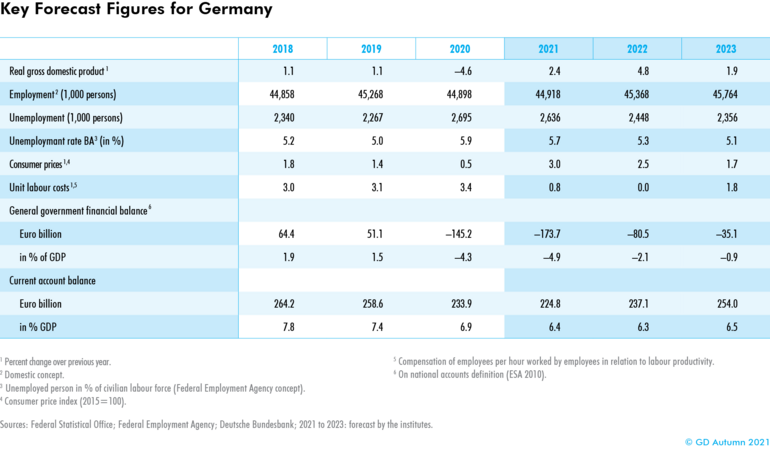News
Joint Economic Forecast 2/2021: Crisis is gradually being overcome – align actions to lower growth

After new waves of infections had delayed the recovery during 2020/2021, Gross Domestic Product rose significantly since the infections subsided in spring. However, supply bottlenecks for intermediate products are hampering production in the manufacturing sector. As a result, only the consumer-related service industries are growing. The recovery will still be slowed down in winter 2021/2022, since activity in the service sector will remain below the usual level during the cold season, even with low levels of infection. In addition, supply bottlenecks will continue to weigh on manufacturing production for the time being. For the coming year, the institutes assume that the adverse effects of the pandemic and of supply bottlenecks will gradually be overcome. Accordingly, normal capacity utilisation will be regained. “Overall, GDP is expected to grow by 2.4% in 2021 and by 4.8% in 2022,” says Oliver Holtemöller, vice president at the Halle Institute for Economic Research (IWH). The institutes expect consumer prices to rise by 3% in the current year and by 2.5% in 2022. The public budget deficit is likely to decline from 4.9% in relation to GDP in the current year to 2.1% in the following year. Given the strong increase in nominal GDP, the government debt-to-GDP ratio is expected to decline from 71% in 2021 to 67% in 2022. The economic consequences of the Corona crisis will be gradually overcome with the return to normal capacity utilisation. “However, the challenges of climate change and the foreseeable lower economic growth due to a shrinking labour force will reduce consumption opportunities,” says Holtemöller.
About the Joint Economic Forecast
The Joint Economic Forecast is published twice a year on behalf of the German Federal Ministry for Economic Affairs and Energy. The following institutes participated in the spring report 2021:
- German Institute for Economic Research (DIW Berlin)
- ifo Institute – Leibniz Institute for Economic Research at the University of Munich e.V. in cooperation with the KOF Swiss Economic Institute at ETH Zurich
- Kiel Institute for the World Economy (IfW Kiel)
- Halle Institute for Economic Research (IWH) – Member of the Leibniz Association
- RWI – Leibniz Institute for Economic Research in cooperation with the Institute for Advanced Studies Vienna

